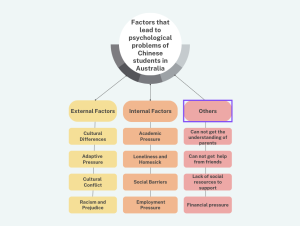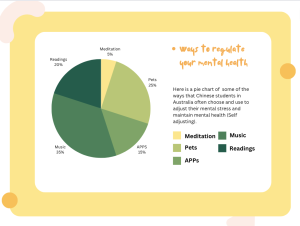
International education in Australia has always been of great value and significance to the country. It gives Australia not only economic value, but also social, cultural, and skilled Labour value. As the largest group of international students in Australia, Chinese students play an important role in Australia’s education industry and society. Therefore, their health and well-being deserve attention.
Surveys and studies have found that Chinese students’ levels of psychological problems such as anxiety, stress and depression have generally increased while studying in Australia, and their levels of happiness have decreased, especially during the pandemic. There are many factors affecting the mental health problems of Chinese international students, including but not limited to language barrier, academic pressure, financial difficulties and educational differences.
These negative mental health problems have also led to some serious consequences, such as anxiety disorders and major depression. In order to reduce the occurrence of adverse consequences, Chinese international students should face up to and pay attention to their mental health problems. Parents, schools and society should also pay more attention and think about this issue.
The causes of the problem
There are many factors that cause students’ mental health problems, such as academic pressure, life pressure, employment pressure and so on. However, the particularity of international students’ mental health problems lies in their loneliness, homesickness, social barriers, discrimination and inter-cultural conflicts in a foreign country. These factors are reflected in the Chinese student group.

One of the interviewees is Jennifer Wang (pseudonym), a Chinese student from USYD. She is in her first semester as a Master. Through communicating with her, I found that her psychological pressure came from many aspects. In her case, the intersections are obvious. In general, she faced different psychological pressures at different stages.
In the early stage of enrolment, she felt conflicted because of the choice of school and major. At the beginning of the semester, she said the difference in environment and culture troubled her a lot. In the middle of the semester, she had difficulty socialising, and that homesickness and loneliness often caused her to feel down. Toward the end of the semester, she said the greatest psychological pressure came from studying and planning for her future.

However, in addition to these common factors, she also pointed out a large part of her psychological problems came from her lack of understanding and support from her parents. She experienced the most serious psychological problems during the pandemic. When she tried to talk to her parents about her pain, they thought it was because she was “thinking too much” or “not strong enough” and “not busy enough”. The lack of understanding from her parents plunged her into deeper pain.
When she recounted these things, she said, “I always felt alone, unworthy of love and good things.” When she tried to talk to her parents about her psychological stress, she said, “My parents would tell me about their troubles and stresses.” “It made me more stressed, and I even felt guilty.”
Existing difficulties and challenges
A common problem among Chinese international students is a lack of courage to speak up. Wongani, an assistant psychologist in Melbourne, said: “Most Chinese students only like to talk to people with the same background as themselves. They do not express their emotions very much.” “Refusing to communicate and avoiding discussing their own psychological experiences and psychological conditions is a major problem.”
Wongani said he understands the pressure that Chinese students feel. “Some expressions of emotion and the need for counselling are not valued in their culture. Seeking counselling is not that common.” Regarding cultural background factors, Wongani said that “Western cultures are more receptive to many new things, while Eastern cultures are often sceptical of new things.”
Interview with Wongani Wellington Mataya
The interviewed Chinese student Jennifer also said that she was struggling with her own heart. “I am afraid to recognize my state. After looking for a psychologist, no matter what the results are, it will make me more broken and painful.”
Methods that can help you adjust your mind
Instead of seeking outside help, Chinese international students are more inclined to self-regulate. According to the questionnaire, popular methods of self-regulation include music, pets, reading, APPs and meditation.

Jennifer said that when she tried to adjust, she usually chose to “cry a lot, talk to a friend, go to the park alone for an afternoon, or watch a funny show.” It is worth mentioning that BTS had a big influence on her. “After hearing BTS’s song about self-love, I told myself that I am the best and I should cherish myself.” Sometimes, personal beliefs and spiritual supports are also a good way to relieve psychological pressure.
On the other hand, it is also important to seek outside help. Wongani mentioned, “The psychological counselling and resources provided by the school are very helpful.” “Usually there will be country-based clubs in the school, so that people of the same culture can interact.” In addition, resources outside the campus Including “Headspace, Beyondblue, Lifeline and other online services are also available for viewing.”
If you are a student at the University of Sydney, you can find out or make an appointment for a consultation by reading about the clinic on the “psychology clinic”. Students can also make appointments and get information based on their needs by visiting the “Health and wellbeing” page on the University of Sydney website. More information on the importance of mental health and related strategies can also be obtained by visiting “Student mental well-being”.
In conclusion, Chinese international students should pay more attention to their mental health, not be afraid to talk to others when they encounter mental problems, and not hesitate to seek more help. They should find their own solutions and make good use of existing social resources and school services to solve problems. Parents should put themselves in their children’s shoes, express their understanding and offer help to them. Schools and society should make more efforts and responses, such as holding more activities to help mental health, holding lectures on relevant topics, and establishing more communities and forums.
Word Count: 1033





Be the first to comment